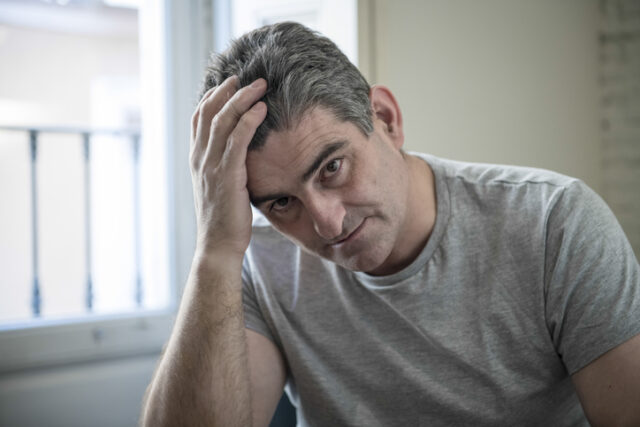You can be afraid of dying without being in a constant state of panic or doom-and-gloom thoughts.

In fact, it usually hangs around in subtle, everyday ways—through avoidance, overcontrol, or habits we don’t even realise are connected to mortality. Many people who don’t think they fear death are still shaped by it in subtle ways they don’t even realise. It might sound morbid, but it’s important to recognise how deep this fear runs, and how it can shape how we live, even when we’re not talking about death at all. These are just some of the ways a fear of death can manifest in someone’s life.
1. Obsessing over productivity

For some, the pressure to constantly be productive comes from a hidden urgency, like life is slipping away, and every second has to “count.” It’s not just ambition; it’s a quiet fear of wasting time before time runs out. This can lead to burnout masked as purpose. Rest starts to feel like failure, and slowing down triggers anxiety. It’s not laziness people fear—it’s mortality dressed up as time management.
2. Overplanning everything

Wanting a plan is normal. But for some, excessive scheduling, backup plans, and future-proofing are ways to manage the uncontrollable. If you can’t stop planning, it might not be about the plans at all—it might be about the fear of what happens when you don’t know what’s coming next. This creates a false sense of safety. Deep down, the desire to predict everything can be a quiet attempt to outrun the chaos that death represents.
3. Avoiding serious conversations

People who joke through every deep topic, shut down emotional chats, or say “let’s not talk about that” often aren’t being cold—they’re scared. Talking about things like ageing, illness, or grief brings mortality too close for comfort. It’s not avoidance out of rudeness. It’s often emotional self-protection. If they keep things light, they don’t have to feel the weight underneath.
4. Struggling with stillness

Being alone or doing nothing can trigger a creeping discomfort in people who haven’t made peace with life’s impermanence. Stillness invites reflection, and reflection can bring up questions about meaning, mortality, and what we’re all really doing here. Some people keep busy not because they love action, but because sitting still reminds them of how fragile everything really is.
5. Panic about ageing

It’s not always about vanity. For many, the fear of getting older isn’t about grey hairs or wrinkles—it’s about the silent countdown. Every birthday can feel like a reminder that time is limited. This fear can sneak into thoughts about appearance, health, or relevance. Underneath it all is often the fear of running out of time before becoming who they want to be, or before life starts to slip away.
6. Trying to control how other people see you

When someone needs constant validation or fears being misunderstood, it can stem from more than just insecurity. For some, it’s about wanting to control the story they’ll leave behind—their “legacy,” even if they never call it that. The fear here isn’t just about being disliked. It’s about vanishing without being seen, understood, or remembered. It’s mortality anxiety disguised as people-pleasing.
7. Fear of letting go

Whether it’s a job, a relationship, or an identity, some people cling tightly to what they know. Letting go feels like a tiny death, like admitting something is over, and that endings can’t be avoided. This fear keeps people stuck in places they’ve long outgrown. The resistance isn’t just about comfort—it’s about avoiding the grief that comes with all forms of loss.
8. Avoiding deep joy

Oddly enough, some people feel anxious when life is going really well. Happiness feels dangerous, like something bad must be around the corner. It’s the emotional version of waiting for the other shoe to drop. That unease is often tied to the fear of loss. If you don’t fully embrace joy, it won’t hurt as much when it’s gone, or so the mind tells you. But this is fear of death in disguise: the fear that all good things will end, so maybe it’s safer not to feel them fully.
9. Overidentifying with achievements

For some, accomplishments are more than milestones—they’re armour. If you build enough, achieve enough, impress enough, maybe mortality won’t matter as much. Maybe you’ll outrun it with success. This is how legacy becomes pressure. If you feel like you have to leave something behind to matter, it can quickly stop being about joy and start being about fear.
10. Discomfort around grief or illness

Some people can’t handle funerals, hospitals, or even talking to friends who are grieving. It’s not because they don’t care—it’s because it activates their own unprocessed fear of death. Instead of showing up, they shut down. This avoidance isn’t selfish—it’s protective. However, left unchecked, it keeps them disconnected at the very times people need connection most.
11. Need for constant stimulation

From endless scrolling to back-to-back plans, the need for stimulation often goes beyond boredom. Silence creates space for existential thoughts, and not everyone is ready to sit with that. Distraction becomes comfort. If your brain is always occupied, it doesn’t have to confront the quieter, more difficult truth that life is short and uncontrollable.
12. Obsessing over health or safety

Caring for your health is one thing—hypervigilance is another. Some people develop health anxiety, compulsive checking, or extreme safety routines as a way to try to prevent the inevitable. Underneath the routines is often fear: not of illness itself, but of the unpredictability and finality that illness represents. It’s control in response to powerlessness.
13. Feeling numb or emotionally detached

For some, fear of death doesn’t show up as panic—it shows up as flatness. A sense of “What’s the point?” or emotional disconnection from people or goals. It’s a subtle kind of grief that’s hard to name. This can be mistaken for laziness or apathy, but it’s often existential heaviness underneath. When nothing feels safe or permanent, it’s hard to fully invest in anything at all.
14. Avoiding spiritual or existential questions

Not everyone wants to wrestle with the big stuff—and that’s okay. But sometimes the resistance to even thinking about meaning, purpose, or mortality is a sign that those topics feel overwhelming or threatening. It’s not that these people don’t care. It’s that opening those doors might bring up fears they’ve kept buried for a long time. And sometimes, the easiest way to deal with fear is not to go there at all.




